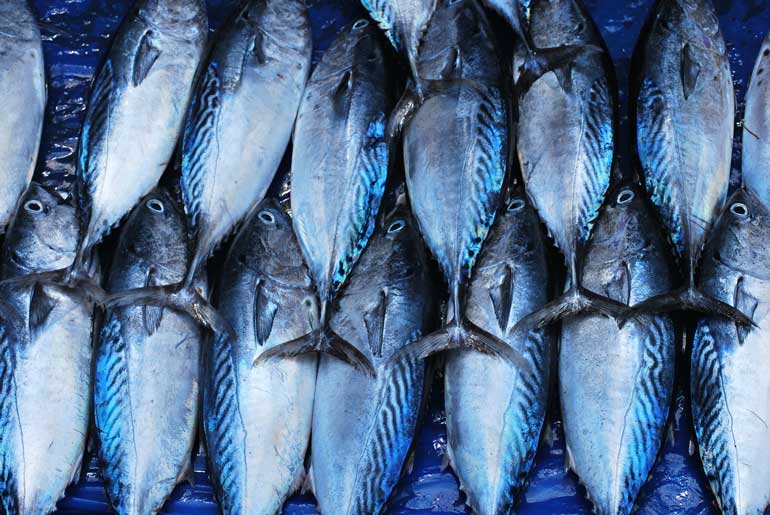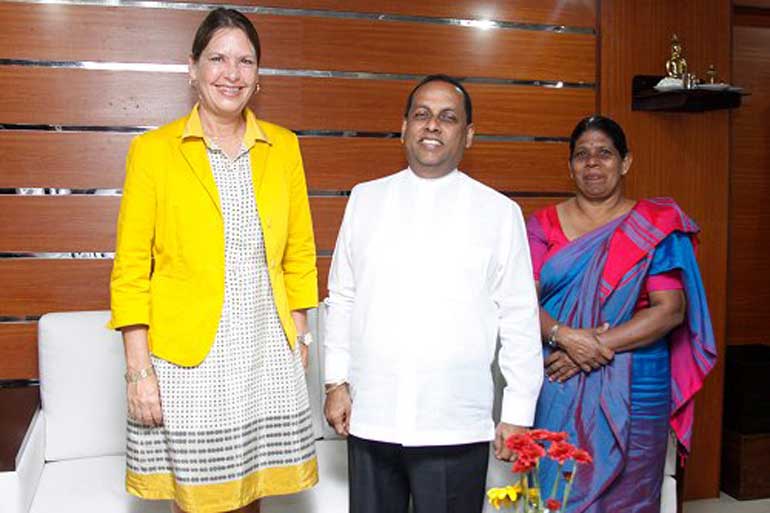Thursday Feb 26, 2026
Thursday Feb 26, 2026
Monday, 25 April 2016 00:00 - - {{hitsCtrl.values.hits}}

The European Commission has released an official press communiqué 21 April stating that the Red Card issued against Sri Lanka will be lifted as it has significantly improved its national fisheries governance. European Commissioner for Environment, Maritime Affairs and Fisheries, Karmenu Vella, said “It also shows that we can bring important players on board: Sri Lanka has now a robust legal and policy framework to fight illegal fishing activities. As the fight against IUU fishing is part of the EU’s commitment towards sustainability and good ocean governance, each third country that comes on board is an asset.”
Why it happened : Key issues raised by DGMARE (Director General Maritime Affairs), EU are
as follows:
On 15 Nov 2012, the European Commission in their first notification to Sri Lanka stated that Sri Lanka pursuant to Article 32 of IUU Regulation that it considered the possibility of identifying SL as a non-cooperating third country and also included the identified shortcomings as below.
a. Adoption of an adequate legal framework much needed for a large scale fishery engaged in fishing activities in international waters.
b. Lack of adequate monitoring of the fishing fleet, which is required in the large scale fishery engaged in fishing activities in international waters.
c. Lack of Observer scheme both scientific and compliance as required as per the RFMO requirements.
d. Lack of sufficiently deterrent sanctioning system against IUU activities in the international waters.
e. Improper implementation of catch certification scheme.
f. General compliance with international obligations including RFMO recommendations and resolutions.
g. Lack of compliance with recommendations and resolutions of United Nations International plan of Action against IUU.
On 14 December 2012 Sri Lanka informed the commission, the institutional arrangements made to address the shortcomings pointed out by EU commission.
Sri Lanka again submitted written comments on 31 December 2012 and 4 January 2013, but the commission requested on the 7 February 2013 to update information of the suggested action plan.
On 13 March 2013 Sri Lanka sent a report with an updated time bound action plan, national plan of action to combat IUU, updates on administrative procedure and guide lines for catch certificate issue, confirmation with regard to establishment of CC office at International Airport, and a draft of the revised legislation related to fishery etc.
Technical discussion was held between DG MARE and SL Fisheries authorities in Brussels on 17 April 2013 and with its submissions on 30 May and 3 June 2013 Sri Lanka stressed the adaptation of legislative amendments to punitive measures against IUU activities and the progress of VMS procumbent process.
Clearly unconvinced the EU Commission as of the 11 June informed SL, that the EU will continue with dialog for a further period of nine (09) months until 28 February 2014 and also a proposal for the plan of action by the commission on the 20 June 2013, however Sri Lanka failed to show tangible and credible action.
Sri Lanka continued to send submissions on the 22 August 2013 and also on the 28 October 2013 and by this time with the confirmation with regard to the amended legislation for international fishery. Sri Lanka submitted another progress report on the 27th March 2014, with additional updates.
The European commission also observed that Sri Lanka had also introduced eight (08) large scale purse-seine vessels without any monitoring devises during the period of 2013 -2014.
The ban and its impact on Sri Lankan exports
Finally in the light of the elements gathered the commission was convinced that Sri Lanka had not sufficiently addressed the areas concerned and all the shortcomings were described in the decision of 15 November 2012.
In view of the conclusion reached with regard to Sri Lanka‘s failure to discharge its duties under international law as flagged, port, coastal or market state and to take action to prevent, deter and eliminate IUU fishing, European Commission in accordance with Article 31 of IUU regulations, considered Sri Lanka as a non-cooperating third country in fighting IUU, thus the Red card was issued on the 15 December 2014 and the actual ban was implemented on the 15 January 2015.
Sri Lanka is the second largest exporter of fresh Tuna and chilled swordfish to the EU. In 2013, Sri Lanka accounted for Euro 74 million of fisheries imports to Europe. The ban’s strongest and most devastating impact was to be borne by Sri Lanka’s fishing community – over 192,000 households and 222,160 fishermen and women who were dependent on fishing as a livelihood lost over half their income. Most of the vessels that used to go in to deep oceans for fishing drastically reduced the frequency of their fishing trips. Large numbers of long line vessels were kept tied down in harbors. It’s not only the fisherman who suffered, but also the processers. All thirty (30) odd processing plants were operating at less than 50% capacity and some of the plants were completely shut down since the ban was implemented. The exporters in fact started recovering only after a year with the new markets and some volume of raw material from Maldives and India to keep the buyers in the EU satisfied.
How did Sri Lanka resolve the biggest threat to the
fishing industry?
President Maithripala Sirisena and the Government of Sri Lanka, immediately upon election embarked on a thorough program to address Sri Lanka’s commitments and obligations under international and regional conventions/agreements resolutions on conservation and sustainable management of fishery resources.
In this backdrop the President of the Seafood Exporters Association of Sri Lanka (SEASL) Prabhash Subasinghe notes with delight, an interesting and a significant change in the approach by the government of Sri Lanka. After 6 days of taking office on 15 January 2015, the Prime Minister Ranil Wickremesinghe called to order his 1st meeting on this subject and thereon appointed a steering committee to monitor and manage the progress of the removal of the red card.
This crucial committee comprised all the related stakeholders, and interestingly included the private sector as well. This was the 1st time that such a high level steering committee was formed between the Government of Sri Lanka and the private sector. In addition the Premier not only addressed the European Union on 14 Jan 2015 but also arranged a delegation visit to Brussels in Jan 2015 headed by Foreign Minister Mangala Samaraweera who was also instrumental in resolving this matter.
SEASL also noted and commended the silent but very effective action taken by the incumbent Minister of Fisheries and Aquatic resources Development, Mahinda Amaraweera. The Fisheries Act was amended around seven times within a very short span of time following his dedicated intervention.
Additional budget allocations, establishment of the Vessel Monitoring Centre, recruitment and training of new personal, introduction of necessary regulations and sanctions, and awareness programs were included in the significant tasks ahead and the country’s prime minister and staff of the prime minister’s office were regularly monitoring progress through the very effective steering committee.
Above outlines how activities related to management of Sri Lankan fishery and combating Illegal, unreported and unregulated fishery were carried out to the satisfaction as per the international obligations by Sri Lanka. Whilst appreciating the Government’s efforts steered by President Maithripala Sirisena, Prime Minister Ranil Wickremesinghe , the Foreign Minister Mangala Samaraweera , the Fisheries Minister Mahinda Amaraweera, the SEASL also does recognise the active role played by the Sri Lankan embassy in Brussels, particularly Ambassador Rodney M. Perera and the Minister of Commerce Gothami De Silva in Brussels who involved in tedious negotiations and coordination between Fisheries bureaucrats from both sides.
Finally it is noteworthy to mention the hardworking officers of the Ministry of Fisheries and Aquatic Resources, Mangalika Adikari, Secretary to the Minister and all her officers along with all the officers of the Department of Fisheries and Aquatic Resources and Christy Lal Fernando the Director General.
In the meantime the Director General of Maritime Affairs of the European Commission was actively engaged in their observations with regard to the progress made from time to time and finally ended in a delegation visit in November 2015 to ensure that the management measures are actually in place. Principal adviser to the commissioner Deben Alfonso Cesar taking part in this inspection visit could be seen as a very positive response. The discussion went on for few more months and finally the conclusive discussion between the Fisheries authorities and DG MARE took place on 6 April 2016 where DGMARE accepted that Sri Lanka has comprehensive and robust management systems for her fishery and to combat IUU fishing.
What is next and
when can we really export to the EU?
The next step will be when the draft commission implementing decision on Sri Lanka reaches the administrative layers, working party on internal and external fisheries policy, the COREPER 1 and AGRIFISH Council/Foreign Affairs Council of the European council, which will take about 2-3 months as per EU practice.
The third step would be for the working party to consider the Draft Commission Implementing Decision on Sri Lanka in 2 weeks, but the process of endorsement of the proposal by WP may take 4-6 weeks as each member state is required to obtain clearance from its local parliamentary reservation process on revoking the Ban
The fourth step is, once recommendations are made, the decision will go through the next two easy passages at COREPER 1 and Council levels.
SEASL is optimistic that the final decision by the council of the European Union on revoking the ban on Sri Lanka may be possible before July 2016 so that Seafood exports to EU countries can actually commence by then.

The United Nations’ Food and Agriculture Organization (FAO) has promised that it will continue facilitating and extending their support to the development of Sri Lanka’s fisheries sector.
This assurance was given by the country representative of FAO, Nina Brandstrup, at a discussion held at the ministry on Wednesday (20 April) with the Minister of Fisheries and Aquatic Resources Development, Mahinda Amaraweera, and a group of ministry officials.
The Secretary to the Ministry of Fisheries and Aquatic Resources Development, Mangalika Adikari, made a request seeking support in introducing modern fishing methods and technology to Sri Lankan fishermen in the process of developing Sri Lanka’s fisheries industry.
The minister mentioned that fish products have become a popular solution adopted by most of the countries encountering the issue of nutritional deficiencies. He also said that public awareness has to be increased over the importance of fish consumption since it provides the highest percentage of total protein necessary for humans. Therefore, Sri Lanka’s fisheries sector needs to be promoted by focusing on the development of marine biotechnology and tissue culture technology, the Minister stated.
The country representative of FAO promised the organisation’s continuous support in developing Sri Lanka’s fisheries sector.